The Dark Art of Lucid Glassing: A New Partnership

Amos Barriskill didn’t anticipate bringing Dark Arts to Ballina's shores when he founded Lucid Glassing: a glassing shop specializing in carbon surf-craft technology. But when a connection made by Daniel "Tomo" Thomson presented the opportunity, he avidly accepted. This collaboration expands Dark Arts production into the southern hemisphere, minimizing shipping costs while maintaining equal quality to boards made stateside. We caught up with Amos to learn the story behind Lucid and hear his perspective on making surfboards in East Oz, finding carbon through hydrofoil experimentation, and what it takes to establish a successful glassing business.

Making surfboards was a familiar art to Amos during his childhood—he grew up outside the intense Byron Bay surf industry.
"We didn't really have access like in the bigger places. You basically waited for one of the older kids to get a new board until you could get his. I guess that was where building your own boards kind of became a necessity. The facts were that we just didn't have boards readily available, so it wasn't that much of a stretch to look at making them for ourselves."-AB

In his late 20s, Amos worked as a surf-guide across the Mentawais, bringing visitors to unsaturated gems (at the time) like Rifles and Macaronis. After each season ended, he returned home to Australia for three months to build and glass traditional PU boards for local shapers while fine-tuning his craftsmanship. Then taking his skills back to Indonesia, he refined his personal shapes while chartering trips to HT's and Greenbush. He continued these trips while also venturing out to other areas, surf-guiding and shaping in Samoa—getting paid to surf along the way.

Reestablishing a home base in Ballina, Amos diverged into the hydrofoil rabbit hole for a period of time. While analyzing the nuances behind hydrofoil boards, he began building boards that could accommodate the hefty wing attached. High torsion flexing the boards drove him to seek carbon fiber as a proper reinforcement. This increased both durability and reactivity. He began making vacuum-bag carbon fiber hydrofoil boards and established his brand, Amos Shapes. Several years later, he noticed that the same method was being applied to surfboards by Dark Arts.
Seeing the success of carbon in the surfing realm sparked new excitement for Amos, and he returned to glassing surfboards for local shapers with a carbon layup—forming the beginning of Lucid Glassing.

"We have spanned nearly eight years now while focused only on the carbon vacuum-bag process, which is our sole priority. We're a small batch manufacturing business and really work to foster that shaper-glasser relationship"-AB

Maintaining a sole focus on carbon layups comes with challenges. For Lucid, they couldn't get enough specialized materials. After trying to go through the general avenues of surfboard manufacturing suppliers, they had to source directly for specialized items like carbon weaves and top-quality EPS blanks.
"We've kept things small; we're a family-run business, and we'd rather make ten high-quality boards a week than risk quality control issues." Amos elaborated, "It's that real hands-on approach with the guys. I'm in the factory every day, leading by example. You've got to be there to ensure the quality is there by working with them."-AB

Amos credits a large portion of the business's success to his partner, Jess, who handles administration and paperwork behind the scenes. While functioning with a total staff of four, Lucid glassed for reputable brands like Wood, Free Flight, Emery, Vouch, and North Coast (the official licensee of Takayama and Gerry Lopez). Through North Coast, Lucid Glassing recently completed a personal milestone for Amos: finishing a Gerry Lopez Pipeliner in a full carbon wrap.
Asking about some of the most rewarding moments while at Lucid, Amos noted, "Working with a few high-profile shapers, you know, guys you've looked up to whole life approaching you to build their boards," and also, "Just seeing guys' opinions change from trying something they weren't familiar with when they've been riding the same shape for years—then trying a new construction—and feeling a new life out of it." Observing the latest shifts towards carbon-inclusive manufacturing techniques, evidently, the surfboard is not past improvement.
"I really think doing carbon boards is just the tip of the iceberg," noted Amos, "Someday, I think it'll be a part of everyone's quiver, and it's driven by that need to have better quality products, a board you can trust will last longer, feel livelier and be able to take it away on holidays without worrying about breaking it." He explained that by having Lucid Glassing in the Ballina community, a "trickle down effect" can catch on and change the proportion of boards you see out in the lineup.

Lucid's values keep production near the surf, which ensures that those making the boards will also have the time to get in the water during their time off. "We employ local craftsmen and create jobs for the local community," Amos pointed out that this differentiates them from other industrial-scale surfboard production companies. Sharing his stoke for the upcoming production of Dark Arts boards, he concluded:
"We feel really strongly that Dark Arts has started this carbon revolution and lifted it to the world stage, so we're really happy to work alongside them in the future."-AB

Greater access to Australian-based shapers will allow for ease of consultation for custom orders and strengthen the rider-shaper relationship. We aim to eliminate the cost-prohibitive shipping logistics that entail shipping from America while ensuring the unparalleled quality behind the Golden Triangle.



